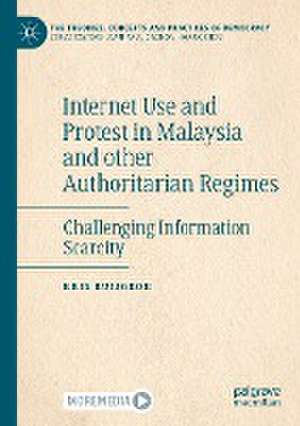Internet Use and Protest in Malaysia and other Authoritarian Regimes: Challenging Information Scarcity: The Theories, Concepts and Practices of Democracy
Autor Kris Ruijgroken Limba Engleză Paperback – 15 apr 2022
This book investigates the impact of internet use on anti-government protesting under authoritarian rule. By breaking up the causal chain into various steps, it provides a thorough and nuanced understanding of internet’s role in different stages of the mobilization process. It argues that the impact of internet use on anti-governmental protesting differs per step in the ‘mobilization chain’, and also that the effect depends on both the on- and offline repression of the regime, as well as on the type of internet that is available. While staying far away from any technologically deterministic claims about the internet, the book demonstrates that the internet especially plays an important role in the early stages of the mobilization process: By exposing citizens to alternative political information online, internet users are more likely to become sympathetic towards anti-governmental protest movements.
| Toate formatele și edițiile | Preț | Express |
|---|---|---|
| Paperback (1) | 778.13 lei 6-8 săpt. | |
| Springer International Publishing – 15 apr 2022 | 778.13 lei 6-8 săpt. | |
| Hardback (1) | 783.35 lei 6-8 săpt. | |
| Springer International Publishing – 14 apr 2021 | 783.35 lei 6-8 săpt. |
Preț: 778.13 lei
Preț vechi: 948.95 lei
-18% Nou
Puncte Express: 1167
Preț estimativ în valută:
148.89€ • 156.02$ • 123.09£
148.89€ • 156.02$ • 123.09£
Carte tipărită la comandă
Livrare economică 11-25 aprilie
Preluare comenzi: 021 569.72.76
Specificații
ISBN-13: 9783030683276
ISBN-10: 3030683273
Ilustrații: XI, 263 p. 15 illus., 11 illus. in color.
Dimensiuni: 148 x 210 mm
Greutate: 0.33 kg
Ediția:1st ed. 2021
Editura: Springer International Publishing
Colecția Palgrave Macmillan
Seria The Theories, Concepts and Practices of Democracy
Locul publicării:Cham, Switzerland
ISBN-10: 3030683273
Ilustrații: XI, 263 p. 15 illus., 11 illus. in color.
Dimensiuni: 148 x 210 mm
Greutate: 0.33 kg
Ediția:1st ed. 2021
Editura: Springer International Publishing
Colecția Palgrave Macmillan
Seria The Theories, Concepts and Practices of Democracy
Locul publicării:Cham, Switzerland
Cuprins
Chapter 1. Introduction.- Chapter 2. The Mobilisation Chain under Authoritarian Rule.- Chapter 3. The Direct Effect of Internet Use on Anti-Government Protest.- Chapter 4. Step 1) Internet Use and Sympathizing with an Anti-Government Protest Movement.- Chapter 5. Step 2) Internet Use and The Informing of Protest Sympathisers.- Chapter 6. Step 3) Internet Use and Being Motivated to Join an Anti-Government Protest.- Chapter 7. Scaling up the Malaysian Findings.- Chapter 8. Conclusions and Reflections.
Notă biografică
Kris Ruijgrok is Lecturer at the PPLE Multi-Disciplinary Institute (Politics, Psychology, Law and Economics), University of Amsterdam, The Netherlands.
Textul de pe ultima copertă
This book investigates the impact of internet use on anti-government protesting under authoritarian rule. By breaking up the causal chain into various steps, it provides a thorough and nuanced understanding of internet’s role in different stages of the mobilization process. It argues that the impact of internet use on anti-governmental protesting differs per step in the ‘mobilization chain’, and also that the effect depends on both the on- and offline repression of the regime, as well as on the type of internet that is available. While staying far away from any technologically deterministic claims about the internet, the book demonstrates that the internet especially plays an important role in the early stages of the mobilization process: By exposing citizens to alternative political information online, internet users are more likely to become sympathetic towards anti-governmental protest movements.
Kris Ruijgrok is Lecturer at the PPLE Multi-Disciplinary Institute (Politics, Psychology, Law and Economics), University of Amsterdam, The Netherlands.
Caracteristici
Argues that social media platforms can play an important role in facilitating and protecting the circulation of alternative online political information in authoritarian cyberspace and anti-government mobilisation? Combines large N- country level analyses to understand wider patterns among authoritarian regimes with an in-depth case study of Malaysia Includes original interview and survey data to empirically trace the causal mechanisms in more detail













